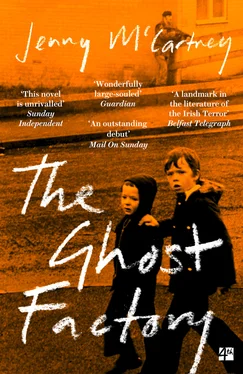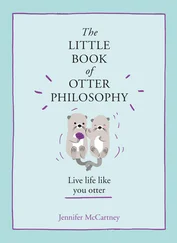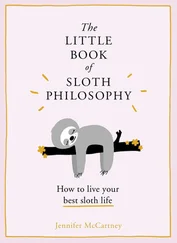She watched me warily, the hazel eyes waiting for a definitive reply.
‘Oh dear,’ I said. It was worse than she knew. I had heard that the McGees were hardmen, heavily involved. The older McGee was a nasty piece of work: rancid with an unnamed resentment, quick to anger and loath to forget any slight. He hung about in a couple of local drinking clubs with a guy called McMullen, who had a pot belly and weaselly eyes, and who was said to have killed at least three people himself. I didn’t know if he had or not, but bad rumours clung to him.
There was no missus on the scene. People whispered that oul McGee’s wife had abandoned the family and Northern Ireland years ago, when her two boys were young, never to return. This was a maternal crime alluded to only in hushed voices, although I heard Titch’s mum say once – as though uttering a small heresy – that she was a good-looking woman and the only one in that family with a civil tongue in her head. For most people, though, the wife’s flight had given her husband a reason for the drop of arsenic in his soul.
From what I remembered, McGee’s grown son now called round after work twice a week to take him to a drinking club where he stayed until the small hours, diligently feeding the next day’s irritable mood with copious amounts of spirits. The son lived a few streets away from me. He had an Alsatian dog tied up in his back yard that growled if it heard anyone walking past.
As a shopkeeper, the da maintained a testy politeness with his regular customers, but he wouldn’t take kindly to some fat chancer just wandering in for a free packet of chocolate bourbons.
‘What exactly happened?’ I asked.
‘I don’t know. You go and speak to him. I can’t get any more out of him.’
I started walking up the stairs towards Titch’s room. Titch was lying on his long-suffering bed, ostentatiously scrutinising one of his mother’s very old Hello! magazines. He had heard me come into the house long ago, which is why any moment now he would affect a sudden surprise at my appearance.
Titch. Physique : overweight, shambolic, implicitly threatening the trembling frame of his single bed. Eyes : pale blue, currently glued with manufactured attention to a picture of Ivana Trump. Mood today : laconic, with a strong undercurrent of surly defiance. His left hand dangled speculatively above a half-open packet of Jacob’s Custard Creams, like one of those mechanical claws you try to pick up prizes with at fairgrounds.
‘Hello,’ he said, without looking up.
‘Is that a tacit acknowledgement of my presence, or are you just rehearsing aloud the title of your reading matter?’ I said. I liked talking this way to Titch.
‘What?’ he said. You had to hand it to Titch, he was a genius of repartee. He was a lord of language, drunk on the endless permutations of the spoken word.
‘You’re a lord of language,’ I said.
‘Bugger off, Jacky,’ he said, mildly. He shifted slightly: the bed frame winced and shivered. I could see he was working up to some tremendous pronouncement. ‘How do you think that Trumpy woman gets her hair to stay like that?’
That did it. I went over and pulled his head round to face mine. The pale blue eyes carried a look of resentful surprise.
‘Listen, you big eejit,’ I hissed. ‘Never mind Ivana fucking Trump’s hairdo. What did you do today in McGee’s shop?’
The eyes widened slightly in recognition, and then floated lazily away from mine. ‘The old man caught me taking a packet of Jaffa Cakes.’
‘Why didn’t you take them from Hackett’s? At least your ma settles up with them at the end of the week.’
‘Hackett’s was closed.’
There you have it: Titch’s immortal logic. Hackett’s shop, his usual stomping ground, was closed. So what did he do? He took himself over to McGee’s, and straight into a row with a muscular wee psycho.
‘So what did he say when he caught you with the biscuits?’
Titch sighed. He wanted me to go away now, but he could see there was no dodging the question.
‘Oul McGee saw me putting them inside my coat, and he came over. He said “What do you think you’re doing you thieving bastard?” I s-said I was going to pay for them. He was squeezing my arm till it hurt, Jacky, and he said ‘You were not, you big fat bastard.’ And he kept on squeezing.’
‘So what did you do?’
‘He was hurting my arm, Jacky, so I told him to f-f-fuck off and gave him a push. He skidded and went flying into his tins of tomato soup.’
In the midst of his self-righteous distress, Titch’s shoulders began to heave with laughter at the memory.
‘Did he fall down? Did anyone see?’
‘Aye, he fell down with all the tins rattling round him. There was no one else in the shop but them two oul Maguire sisters. They were letting on they were shocked, but I saw one of them laughing into her coat collar.’
I sat on the chair beside his bed and stared at him, hard. He looked back at me, guiltily, but still with that little smile twitching somewhere beneath his smooth, pasty skin. I knew he was secretly freeze-framing the image of old McGee toppling backwards in furious disbelief, his arms and legs waggling comically as the soup tins clattered around him. Titch was savouring that moment like a mouthful of stolen Jaffa Cakes.
‘It’s not as funny as you think. You know your aunt in Newry,’ I said. ‘If I were you, I’d go and stay with her for a while.’
His mind slowly wheeled round to face this new and unwelcome proposition. The mouth made a brief ‘O’ of apprehension.
‘I don’t like that aunt. She’s always nagging me and she never gives me enough to eat. Why?’ he said.
‘Because you knocked down old McGee and made him look stupid,’ I shouted. ‘And McGee’s son is apparently well connected. So the next time you go dandering down the street, looking for new biscuits to stuff into your fat face, you’re liable to get a severe hammering. You think that it hurt when McGee squeezed your arm. It’ll be nothing compared to this: you won’t be able to walk right for a year.’
‘Aw Jacky, they would never do anything about that. I only gave him a wee push.’ He picked up his Hello! magazine again, stubbornly. ‘And I gave him his Jaffa Cakes back.’
There was no talking to him. Sometimes Titch reminded me of a vast, impenetrable animal: a whale maybe, drifting through yesterday and today, in some unreachable element of his own. Warnings bounced off him. He swam around in the blue water of his mother’s love, and the harsher currents of my affection. He couldn’t understand that something entirely different, something much darker and nastier, might be waiting out there for him.
I could warn him about getting a hammering, all right. I could also warn him about the grave possibility of a Martian invasion in ten years’ time. It was all part of the meaningless, potential Future: all one and the same to Titch. Defeated, I took one of his custard creams. He looked up: ‘Hey Jacky don’t be eating all my biscuits. I’ve only got twelve left.’ He was trying, clumsily, to charm me out of my mysterious bad mood. I got up to leave: ‘Don’t be looking for women in those gossip mags: you’ll end up with an ex-wife who takes you to the cleaners for your Hobnobs.’
His mother was waiting at the bottom of the stairs, an unravelling parcel of nerves. I told her: ‘He knocked old McGee over. I’d get him up to your sister’s in Newry if I were you.’
She was on the verge of tears: ‘There’s no way he’ll agree to go.’
In the days that followed, I pushed the business about Titch to the back of my mind like a stack of unpaid bills. Titch wouldn’t go to Newry, and I was in no position to kidnap twenty stone of struggling biscuit-snatcher and take him up there by myself. And it wasn’t just Titch, there was something else, too. No one ever really believes in something bad until it happens. Not even the one who predicts it.
Читать дальше












